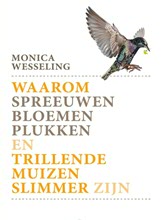Fascinerende verhalen van Groningse biologen in boek Monica Wesseling

De biologie zit vol fascinerende verhalen. Onderzoekers van het Groningen Institute for Evolutionary Life Sciences GELIFES van de Rijksuniversiteit Groningen (RUG) vertelden hun verhalen aan Natuurjournaliste en schrijfster Monica Wesseling. De uitkomsten van hun onderzoeken zijn gebundeld in het boek ‘Waarom spreeuwen bloemen plukken en trillende muizen slimmer zijn’. Het boek verschijnt op dinsdag 4 oktober bij uitgeverij Kosmos. De verhalen erin zijn zeer divers, van onderzoek naar extreme agressie tot de samenwerking tussen kevers en van stampende neushoorns tot de linkspotigheid c.q. -handigheid bij muis en mens.
Groningen loopt voorop
GELIFES richt zich op het kenmerk van leven: dat het zich steeds maar weer weet aan te passen aan veranderende omstandigheden. Directeur van het Groningse instituut prof. dr. Ton Groothuis: ‘We brengen twee benaderingen van levenswetenschappen bij elkaar die in de loop der jaren uit elkaar zijn gegroeid. Enerzijds hoe mens en dier zich aanpassen aan veranderende omstandigheden en anderzijds de evolutie, dus hoe soorten zich in de loop der tijd hebben aangepast. We kijken bijvoorbeeld niet alleen naar hoe we ziek worden, maar ook waarom we ziek worden. Groningen loopt daarin voorop, de integrale benadering wordt inmiddels internationaal herkend. Over tien jaar staat Groningen in de frontlinie van de wetenschap’.
Enkele vraag leidt tot een heel boek
Het contact met de Groningse onderzoekers kwam tot stand na een telefoongesprek tussen Monica Wesseling en GELIFES-directeur prof.dr. Ton Groothuis: ‘Nav een interview voor dagblad Trouw over mijn eigen onderzoek realiseerden Monica en ik samen hoeveel meer het nieuwe instituut eigenlijk te bieden had. Onderzoek met een intrigerende vraag of resultaat dat veelal verborgen blijft voor niet ingewijden maar waarvoor bij het brede publiek wel degelijk veel belangstelling bestaat. Immers, wetenschappers vinden de wereld om ons heen net zo intrigerend als veel niet wetenschappers.’
Bekijk ook de video die de RUG maakte over het boek.
Meer informatie
- Voor meer informatie of een interview neem contact op met de auteur: Monica Wesseling. Tel 071-5897600 of 06-25263667
- Voor een recensie-exemplaar, neem contact op met Kosmos Uitgeverij: Kelly Weerdestijn, E. kweerdestijn@kosmosuitgevers.nl, T. 088-7002699
- Prof. dr. Ton Groothuis is te bereiken via 050-3632068 of via a.g.g.groothuis rug.nl
- Kijk ook op http://www.rug.nl/research/gelifes/
Meer nieuws
-
17 februari 2026
De lange zoektocht naar nieuwe fysica
-
10 februari 2026
Waarom slechts een klein aantal planeten geschikt is voor leven
